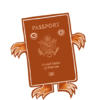Have you ever flown internationally to or from the US?
Because you've flown internationally
When you check in for any international flight to, from, or that flies over the U.S., your personal data and itinerary is shared with Customs and Border Protection (CBP). They receive it via the Advanced Passenger Information System (APIS)Opens in new tab. A CBP or TSA officer scans your passport or ID, pulling up your full name, date of birth, and citizenship. This can then be used to retrieve information about your scheduled flight. This data is used to create “passenger manifests,” which are commercial airline records sent to CBP for vetting in real-time. CBP vets every single passenger before they board.
ICE is also able to subscribe to TECS/ICMOpens in new tab notifications. These “lookouts” inform them when someone they are surveilling is traveling abroad.
Some data systems you may encounter if you fly internationally include Passenger Name Records (PNR)Opens in new tab, the Automated Targeting System (ATS)Opens in new tab, Analytical Framework for Intelligence (AFI)Opens in new tab, third-party vendors that handle reservations and booking, and commercial airline databases.
To see what databases would track you if your answer had been no, click the no button.
If you've ever crossed a border
You can be in these systems even if you haven’t flown internationally. If you’ve passed through a US border checkpoint in a car, bus, on a boat, or on foot, you have a “permanent record” on file that details your journey and identity.
Some data systems you might have encountered include Advanced Passenger Information System (APIS)Opens in new tab and TECS/ICMOpens in new tab.
To see what databases would track you if your answer had been yes, click the yes button.
- Advanced Passenger Information System (APIS) Opens in new tab Because you've flown internationally
- ICM/TECS Opens in new tab If you've ever crossed a border




